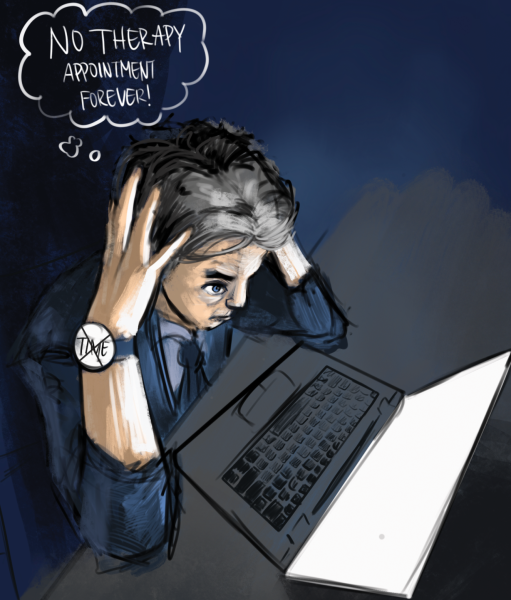
“I was screaming at the screen.”
That’s what Superintendent Don Austin said of his experience trying to access mental health services through the district’s systems.
“I started to notice it [mental health struggles in] March, and didn’t reach out until May, which I think is probably super common,” Austin said. “I could feel it getting progressively worse. But I just kept thinking I could get through it, tomorrow will be better. And tomorrow wasn’t better. … [In] April, [it] started to get more significant, to where I really started to have to fake my way around this office. And then May was just torture. It was horrible.”
Austin said that he felt alone in his experience before he was able to get help.
“I think when you’re in the middle of … essentially a crisis when it comes to your mental health, you think you’re the only person to have ever had that problem,” he said. “You don’t think straight and you feel alone, even if you’ve got people around you. … It was a really terrible time. But once I started to get the help I needed and I started getting my feet back under me, I became less embarrassed about it.”
Austin said that he struggled to access care quickly and easily. “My struggle was it took me 18 [calls], it was [after] 19 [calls] where I finally got to talk to somebody,” he said. “That’s ridiculous. Finally I got to somebody on No. 19. It was through my primary health care provider. Now that’s more for long-term care. And once I got there, and it took weeks to get there, and every day was worse than the day before as this is going. She [a therapist] pretty quickly got me feeling like okay, there’s hope.”
Austin first shared his story publicly at an annual Palo Alto Unified School District kickoff event in August. The event, known as the Chowdown, took place at Henry M. Gunn High School. Weeks later, in an interview with Verde, Austin shared further details about his mental health story, his choice to share it and the new resources available for staff and teachers.
As a result of his experience, Austin led an overhaul of the district’s mental health services for teachers and staff. This included hiring Lisa Romero, an in-house specialist who can be seen on demand and redesigning the website where teachers and staff access resources. Austin said that the district has been getting positive feedback about the new system.
“The feedback we’re getting right now is amazing, that you can literally pick up the phone or go on your computer and be seen,” he said. “It’s seamless. It’s confidential. It’s fast. That wasn’t true. So for that, I feel really good.”
According to Austin, Romero will also be helping staff and teachers get connected to longer term care.
“I would frame this as the equivalent of like a tier three support [system], when you’re actually seeing a therapist, either short or long term,” he said. “Lisa Romero’s gonna be great for this, for the people that need to see someone a few times and work through something. But I think [what’s] just as important is that she’s also going to help people navigate the system to get to long term health care.”
Austin said that “a lot of reflection” led him to share his story at the event.
“I really experienced something that was new to me and probably not new to other people,” Austin said. “If you have a perception that a 52-year-old, 6-foot-4, ex-athlete superintendent always has everything together and is always in control because he’s got a deep voice and can wear a suit, you’re missing it.”
Austin said that he felt an obligation to share his story as a leader.
“If I’m in a leadership position, and I am, I can’t be the person that says, ‘You guys might be struggling. And because I’ve got my stuff all together, I’m going to do these things for you,’” Austin said. “Then I’m that guy that has to portray [himself] like I’m something invincible. And I’m not. So I thought it was important to share and be the person that stands up there and says, ‘You might be feeling like this. And so did I.’”
PAUSD’s Director of mental health & wellness, Dawn Yoshinaga, said that Austin’s choice to share his story had a large impact on on the district’s mental health program.
“That speech that Dr. Austin gave really … changed a lot of things overnight for a lot of us,” Yoshinaga said.
“I think just having that vulnerability out there and sharing that piece where everybody could connect … I think that normalization and destigmatization that he’s talking about is a real thing. ”
Yoshinaga said that Austin’s decision to share his story has helped bring attention to the district’s new resources and facilitate conversations surrounding mental health.
“I’ve been talking to principals and they’re having conversations with people about their sessions … not necessarily Lisa Romero but maybe their own private therapy,” she said. “I feel like that has really helped us grow the program.”
Austin said that the previous website setup made resources difficult to access.
“Why are you going to a mental health website? You’re probably not looking because you’re feeling awesome that day,” Austin said. “The last thing you want to do is feel stupid about not being able to find something on a website. And I was. I was screaming at the screen. And then I got to think[ing], I’m actually in charge of this. I’m essentially screaming at myself right now.”
Austin said that the district will now excel in teacher mental health services.
“Did we do a good enough job for staff mental health in the past? No,” he said. “Straight up. No. Where are we now? … We’re at, or above the standard of the state. Now we’re gonna lead the state.”
Scan the QR code below or visit https://www.caresolace.com/site/pausdfamilies to access resources for Palo Alto Unified School District students, staff and families.

Related stories:


